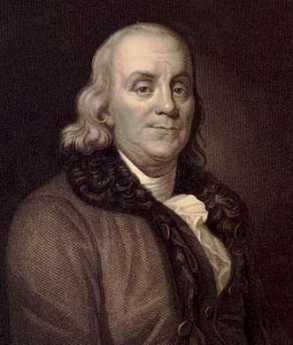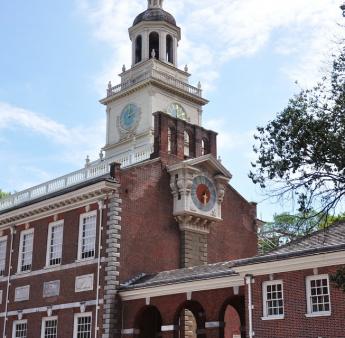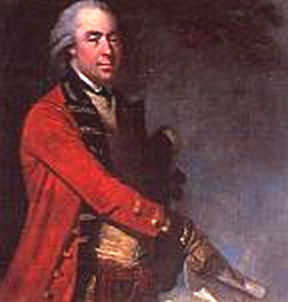Related Topics
Benjamin Franklin
A collection of Benjamin Franklin tidbits that relate Philadelphia's revolutionary prelate to his moving around the city, the colonies, and the world.

Religious Philadelphia
William Penn wanted a colony with religious freedom. A considerable number, if not the majority, of American religious denominations were founded in this city. The main misconception about religious Philadelphia is that it is Quaker-dominated. But the broader misconception is that it is not Quaker-dominated.
Philadelphia Legal Scene
The American legal profession grew up in this town, creating institutions and traditions that set the style for everyone else. Boston, New York and Washington have lots of influential lawyers, but Philadelphia shapes the legal profession.
Bystanders to the Revolution
It wasn't heroic to everyone.
Revolutionary Philadelphia's Patriots
All kinds of people were patriots in 1776, and many of them were all mixed up about what was going on and how they stood. Hotheads in the London Coffee House stirred up about an inoffensive Tea Act, Scotch-Irish come here to escape the British Crown, the local artisan class and the local smuggler class, unexpectedly prospering under non-importation, and the local gentry -- offended to be denied seats in Parliament like other Englishmen. Pennsylvania wavered until Ben Franklin stepped forward with a plan.
Causes of the American Revolution
Britain and its colonies had outgrown Eighteenth Century techniques of governance. Unfortunately, both England and America lacked the sophistication to make drastic changes smoothly.
Tourist Walk in Olde Philadelphia
Colonial Philadelphia can be seen in a hard day's walk, if you stick to the center of town.
Up Market Street to Sixth and Walnut
 Millions of eye patients have been asked to read the passage from Franklin's autobiography, "I walked up Market Street, etc." which is commonly printed on eye-test cards. Here's your chance to do it.
Millions of eye patients have been asked to read the passage from Franklin's autobiography, "I walked up Market Street, etc." which is commonly printed on eye-test cards. Here's your chance to do it.
Pacifist Pennsylvania, Invaded Many Times
Pennsylvania was founded as a pacifist utopia, and currently regards itself as protected by vast oceans. But Pennsylvania has been seriously invaded at least six times.
Franklin Declares Independence a Year Early
Joseph Priestly became a close friend of Benjamin Franklin almost as soon as they met. Priestly was an Anglican clergyman who broke loose and formed the Unitarian Church, and meanwhile, his scientific discoveries also entitle him to be called the Father of Chemistry. Franklin, of course, was the discoverer of electricity; it would be hard to be sure which of the two was more brilliant. In July, 1775, Franklin wrote the following letter to Priestly, which makes a trenchant case that the American colonies should, and would, break away from England. Since some legal authorities, following Lincoln's lead, maintain that Jefferson's manifesto "informs" the United States Constitution, it might be well to begin referring to this letter as an even clearer statement of the mindset of America's founding leaders.

|
| General Thomas Gage |
" Dear Friend (wrote Franklin),
"The Congress met at a time when all minds were so exasperated by the perfidy of General Gage, and his attack on the country people (i.e. Of Lexington and Concord), that propositions of attempting an accommodation were not much relished; and it has been with difficulty that we have carried another humble petition to the crown, to give Britain one more chance, one opportunity more of recovering the friendship of the colonies; which however I think she has not sense enough to embrace, and so I conclude she has lost them forever.
"She has begun to burn our seaport towns; secure, I suppose, that we shall never be able to return the outrage in kind. She may doubtless destroy them all; but if she wishes to recover our commerce, are these the probable means? She must certainly be distracted; for no tradesman out of Bedlam ever thought of increasing the number of his customers by knocking them on the head; or of enabling them to pay their debts by burning their houses.
"If she wishes to have us subjects and that we should submit to her as our compound sovereign, she is now giving us such miserable specimens of her government, that we shall ever detest and avoid it, as a complication of robbery, murder, famine, fire, and pestilence.
"You will have heard before this reaches you, of the treacherous conduct to the remaining people in Boston, in detaining their goods, after stipulating to let them go out with their effects; on pretence that merchants goods were not effects; -- the defeat of a great body of his troops by the country people at Lexington; some other small advantages gained in skirmishes with their troops; and the action at Bunker's-hill, in which they were twice repulsed, and the third time gained a dear victory. Enough has happened, one would think, to convince your ministers that the Americans will fight and that this is a harder nut to crack than they imagined.
"We have not yet applied to any foreign power for assistance; nor offered our commerce for their friendship. Perhaps we never may: Yet it is natural to think of it if we are pressed.
"We have now an army on our establishment which still holds yours besieged.
"My time was never more fully employed. In the morning at 6, I am at the committee of safety, appointed by the assembly to put the province in a state of defense; which committee holds till near 9, when I am at the Congress, and that sits till after 4 in the afternoon. Both these bodies proceed with the greatest unanimity, and their meetings are well attended. It will scarce be credited in Britain that men can be as diligent with us from zeal for the public good, as with you for thousands per annum. -- Such is the difference between uncorrupted new states and corrupted old ones.
"Great frugality and great industry now become fashionable here: Gentlemen who used to entertain with two or three courses, pride themselves now in treating with simple beef and pudding. By these means, and the stoppage of our consumptive trade with Britain, we shall be better able to pay our voluntary taxes for the support of our troops. Our savings in the article of trade amount to near five million sterling per annum.
"I shall communicate your letter to Mr. Winthrop, but the camp is at Cambridge, and he has as little leisure for philosophy as myself. * * * Believe me ever, with sincere esteem, my dear friend, Yours most affectionately."
[Philadelphia, 7th July, 1775.]
REFERENCES
| The Invention of Air: A Story of Science, Faith, Revolution,and The Birth of America, Steven Johnson ISBN: 978-1-59448-852-8 | Amazon |
Originally published: Wednesday, December 13, 2006; most-recently modified: Friday, September 20, 2019
| Posted by: Chris Bryant | Apr 5, 2014 1:22 PM |
| Posted by: Ben | Feb 24, 2013 1:50 PM |